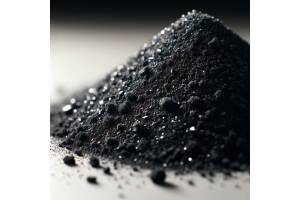These materials, whether as a desiccant, carrier material or additive, pose complex challenges due to their specific properties such as different particle sizes, hygroscopic nature, dust formation and abrasiveness. Especially when used in food supplements, purity and gentle product processing are crucial.
Screening ensures compliance with strict quality standards by classifying the materials into particle sizes and removing unwanted particles such as fine dust or oversized particles. This optimizes both further processing and the overall quality of the end product.
Screening of silica powder and gel
In the processing of silica and silica gel, screening machines are used in several production steps:
- Dedusting: removal of fine dust (<0.1 mm/ 140 mesh) to minimize clumping and dust pollution.
- Classification: separation into specific fractions, e.g. 0.1-0.5 mm (140 – 35 mesh) for powdery products or 1-6 mm (18-3 mesh) for granulates
- Oversize separation: Removal of oversized particles (>6 mm/ 3 mesh) that could affect product quality.
Challenges at silica screening
- Hygroscopic: Moisture leads to clumping and screen blinding.
- Development of fine dust: Requires dust-tight machines for safe operation.
- Agglomeration: Particularly with fine particles (<0.1 mm/140 mesh), particle accumulation occurs, which makes the separation process more difficult.
- Hygienic requirements: For use in food supplements, machines must be food-safe and easy to clean.
- Abrasive: High wear on screen cloths and machine parts.
The solution: RHEsono or RHEfino
RHEsono and RHEfino screening machines with the matching RHEmid or RHEside feeding systems have been supplied worldwide - from the Netherlands and China to Korea and Venezuela - for these demanding tasks. This combination offers significant advantages:
- High vibration forces directly on the screen cloth: Dissolve agglomerates and ensure precise separation of even the finest particles.
- Dust-proof and gentle on the product: Fulfill the highest safety requirements and maintain material quality - ideal for applications in the food and pharmaceutical industries.
- Automatic cleaning cycles: Minimize screen blinding and maximize throughput.
- Flexibility in separation: From 0.1 mm to 6 mm (140 to 3 mesh) in just one machine - depending on the application and material requirements.
The RHEWUM promise:
- Precision: Perfect separation in narrow particle size ranges, adapted to individual customer requirements.
- Efficiency: Maximum productivity thanks to automatic cleaning and dust-tight operation.
- Global experience: Many years of expertise and proven solutions in a wide range of regions and industries.
- Hygiene and product protection: Special solutions for the requirements of the food and pharmaceutical industries.
- Durability: Robust design that can even withstand abrasive materials.
Contact us today and let us build the most precise and efficient screening machine for your silica or silica gel.




